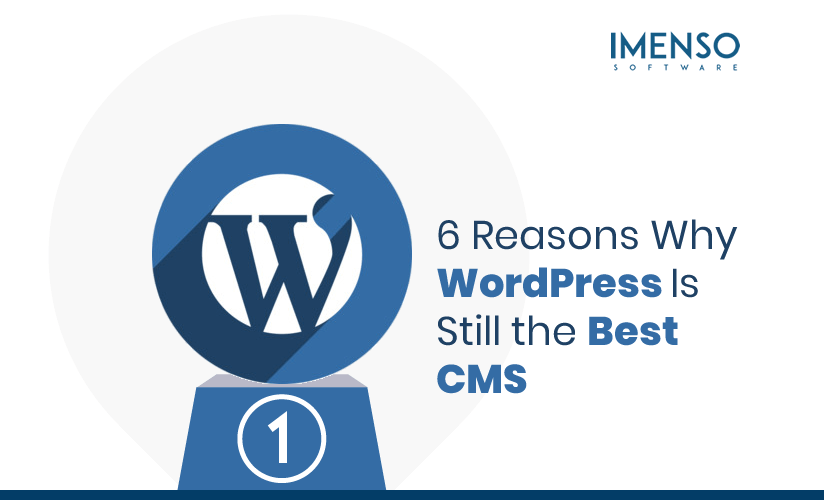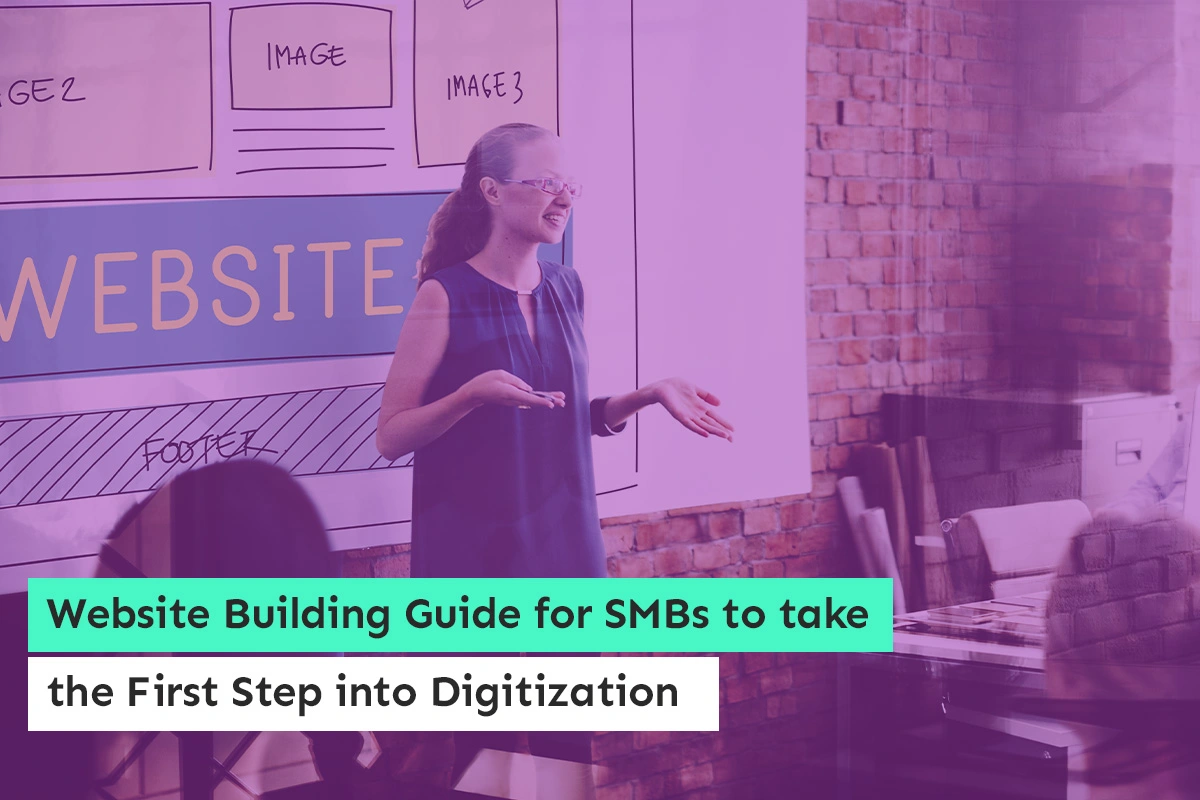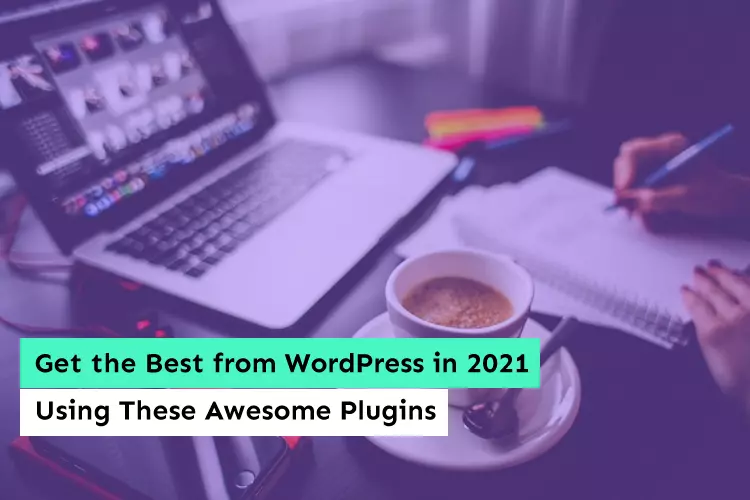6 Reasons Why WordPress Is Still the Best CMS

Whenever someone thinks of creating a blog or open an eCommerce store, WordPress is the first choice for many. Why is it so?
But first, let’s see how it all started.
WordPress was released on May 27th 2003, and this year the blogging platform will celebrate its 18th birthday. It’s not just the easy installation and intuitive design that has made it the most successful CMS platform. WordPress has evolved from being a blogger friendly platform to a CRM trusted by fortune 500 companies and eCommerce stores with millions of dollars in sales.
WordPress Success Glimpses
– After the popular blogging system b2/cafelog shuts down, Matt Mullenweg, a college student creates his version of b2 with Mike Little. They named it WordPress.
– Both the founders launched the first version of WordPress on 27 may, 2003, WordPress 0.7 followed by the first update – Davis in January 2004.
– By 2011, WordPress reached an impressive milestone of 50 million WordPress blogs and three years later 22% of all the world’s website is being built using WordPress.
– The parent company of WordPress, Automattic is now has a $3 billion valuation.
So what made WordPress so successful?

1. Ease of Use
Since the release of the first version, WordPress has had many updates which have made it the easiest CMS to get started with. Both user management and website management is super easy. Millions of webmaster trust WordPress across the world.
From installation to setting up an entire website, it takes minutes. And nobody has to be an expert at coding or know how to build a website using HTML. With absolutely no code, any kind of website is ready on WordPress.
Read Blog: Top 3 WordPress Development Tools
The simple backend dashboard has a user-friendly interface. The layout and language are set in a way that makes it possible for anyone to run a professional website. The entire website’ content, media, settings, and installed plugins can be accessed from it.
2. It’s Free
It is and has always been free. WordPress since its inception has been cost-effective for users worldwide. (Although large enterprises should keep the cost of hosting and domain in mind.)
The pricing structure of WordPress is simple. Even if you don’t like the free themes and layout. There are thousands of paid ones available with professional pictures to choose from. The themes are available for all price range from affordable to $10,000 per year for customized themes with built-in features.

3. SEO Friendly
WordPress has been vastly successful and one of the major reasons is that it’s SEO friendly. The content management system solves a lot of SEO issues automatically and offers tons of tools to optimize your website for better reach.
- WordPress has the inbuilt functionality to be search engine friendly. When the search engine robots crawl the WordPress website, it is easily indexed. WordPress also offers the plugin, Yoast SEO to improve site performance.
- Google loves a website that has optimized content, mobile-friendliness and easy navigation. And WordPress has all three. That is why Google adores WordPress sites.
- Not just Google, WordPress is compatible with other search engines as well: Yahoo, Bing and Firefox. So WordPress can get traffic from anywhere and it’s not a problem.
- WordPress sites have responsive architecture and are mobile-friendly too. Now that more and more people are going mobile-first, Google has made it mandatory for websites to have responsive designs. Thus WordPress websites rank higher for mobile searches as well.
- To optimize content for SEO, WordPress allows all the major settings: H1, H2 tags, Meta title and description, image optimization, and internal linking. WordPress has plugins for all the major SEO factors.
- WordPress websites load faster. Even if has been around for so long, WordPress has made sure to evolve to match the ever upgrading Google standards. A faster loading website is good for user retention, lesser bouncing rates and paid campaigns as well.
Read Blog: SEO Friendly urls not working in wordpress on IIS Server
WordPress as a content management system has a whole package of SEO. There are plugins for all major factors separately and combined. With WordPress as your CMS, you won’t have to worry about your site performance as per SEO again.
4. A Website For Everyone (Literally)
What WordPress might lack in native functionality, it covers up in plugins. The brilliant model of plugins is what WordPress is known for. The plugin structure and availability on WordPress is second to none.
There are over 200 free themes for everybody to install and experiment with. And much more third party plugins and themes for businesses and individuals to create customized websites.
The themes are highly flexible, one can alter color and fonts to manufacture a unique website for their business or eCommerce store such that no two websites are the same.
Read Blog: Is Shopify the best eCommerce Solution for your Business in 2021?
WordPress has a vast and ever-expanding ecosystem of themes, plugins and new features because it is open-sourced. That means anybody can create any kind of website they want with WordPress.
It is not just a blogging platform. The open-source feature has made WordPress rank in the top list of big enterprises, multinational companies to small non-profitable charities. Using woo commerce, it has never been easy to create an eCommerce store on WordPress.
Since its first launch the content management system has evolved into a beast that caters to every possible imagination of people for creating and managing websites.
5. Universal Users
There are over 75 million websites that use WordPress according to the WordCamp site. People across the planet from different countries use WordPress to build their personal and business websites. The standard composition of the dashboard is best for remote working teams. Multi-language translation can also be achieved through plugins to accommodate just about anyone.
6. Excellent Community Support
There is no official support from WordPress.org, but there is a huge community of WordPress developers. One can post questions or emails in forums and get an answer to any question fairly quickly. Like Reddit, the community always help each other out. Even the follow-ups are easy.
Read Blog: 7 Ways to improve your WordPress Website Security
Future of WordPress

WordPress is not the only content management system, but it has been around long enough to conclude that it is not going anywhere soon.
The owners and developers work hard to ensure that the users are delivered with time-relevant updates and features that make using the platform worthwhile.

Our WordPress development team loves geeking out about plugins, themes and write code to create better features on the open-sourced CMS. If you need an expert WordPress developer, just send a mail.
Also, keep reading the blog in future for more information about WordPress.
Similar Posts

Website Building Guide for SMBs to take the First Step into Digitization
Are you a small-business owner? Do you want to reach more customers? A website with an intuitive interface is essential for small businesses, and a website can help you grow and succeed. Learn more about how a website for a business can help you rise above the rest....

SEO Friendly urls not working in wordpress on IIS Server
Have you just changed to an SEO-friendly URL on WordPress? Do you encounter broken links, and 404 page not found issues regularly? WordPress is SEO friendly in terms of being optimized to accommodate search engine rankings and the permalinks are one of the features that make it SEO friendly. However, if one uses WordPress on […]...

Get the Best from WordPress in 2021 Using These Awesome Plugins
Web development tools and frameworks are aplenty, and the developers are getting spoilt for choice when it comes to picking the apt tool for work. However, amidst these options, some old-time players hold their forte well, and the user base remains intact too....








